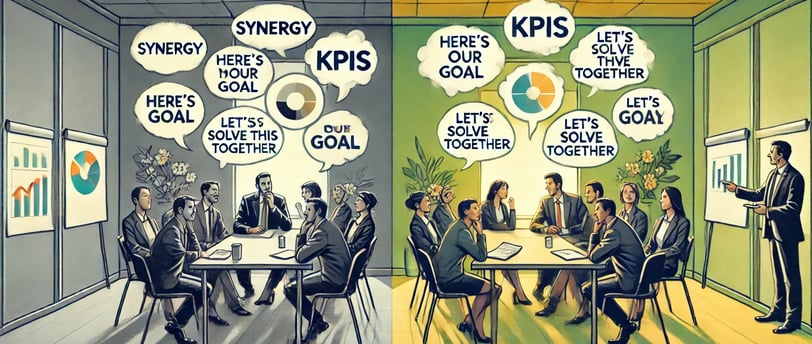Managers: How to improve your communication to engage your teams
Discover the keys to effective managerial communication through neuroscience and social sciences. Managers adopt practices that captivate your teams and increase their engagement
COMMUNICATIONMANAGEMENT
LYDIE GOYENETCHE
1/12/20253 min read


"Managers: Talk to your teams, not their reptilian brains!"
Communicating with your teams is a delicate art. Sometimes it's not the quality of your ideas that is lacking, but the way they are conveyed. To explore how to communicate better, let's take inspiration from big names, whether they come from neuroscience, social sciences or popular culture. Because if Einstein, Darwin or even Netflix can teach us anything, it is that clarity and emotion are essential to captivate an audience.
"Einstein was right: simplify, but not too much"
Albert Einstein said: "If you can't explain something simply, then you don't understand it enough." The human brain loves simplicity, especially when it comes to receiving instructions. The archaic brain, the oldest part of our brain, hates complicated messages. If you overload your jargon phrases like "maximize cross-functional synergies," you risk losing your audience before you even start.
Take the example of a meeting where you want to motivate your teams. Rather than saying, "We need to adopt a holistic, bottom-up strategy," use a clear phrase like, "Share your ideas, they will help us improve our strategy." Not only is this more understandable, but it also engages your employees more.
"Darwin and the art of evolution: capture emotion to survive"
Charles Darwin taught us that it is not the strongest who survives, but the one who adapts. In communication, this means addressing the limbic system, the part of the brain that manages emotions. Without emotion, a message remains flat and ends up in oblivion. Conversely, a well-told story or a memorable anecdote can turn a mundane piece of information into a memorable one.
Imagine a meeting where, instead of talking about dry numbers, you talk about a recent success story of the team. Saying "Last year, thanks to your efforts, we achieved an ambitious goal" will have much more impact than presenting an Excel spreadsheet. This type of narrative triggers positive emotions and strengthens the bond between the manager and his team.
"Netflix and the secret of a good plot"
Netflix knows how to captivate its audience: a clear plot, interesting characters, and a satisfying ending. Your meetings should follow the same principle. If they are poorly structured or too long, they risk losing your employees along the way.
A good meeting, like a good movie, should answer simple questions: what's the problem and what's the solution? For example, rather than endlessly discussing a vague strategy, present a specific agenda and concrete solutions. And remember: if you exceed 45 minutes, at least bring snacks, because no one listens on an empty stomach.
"Brené Brown and the power of vulnerability"
Brené Brown, an expert in vulnerability and leadership, reminds us that showing your imperfections can be a strength. There is no such thing as perfect managers, and your teams don't expect you to be infallible. Acknowledging your mistakes is proving that you are human, and it creates a climate of trust.
Imagine telling your team, "I made a mistake on this project, but here's what I learned and how we can avoid this in the future." This kind of honesty not only gives credibility to your leadership, but also inspires your employees to be more open about their own challenges.
"Aristotle and the balance of feedback"
Aristotle advocated moderation in all things. This also applies to feedback. Too critical, and you demotivate your teams. Too vague, and you miss the opportunity to help them progress. Finding the right balance means offering a balanced return that combines recognition and improvement.
Rather than saying, "Your report was bad," try, "Your report has some good ideas, but the presentation could be improved. How about working together to make it clearer?" This type of feedback mobilizes emotional memory and motivates your employees to give the best of themselves.
Conclusion: Communicate like a storyteller, not a robot
Communicating with your teams is like telling a good story: it requires clarity, emotion, and a solid structure. Draw inspiration from the lessons of Einstein, Darwin, Netflix, Brené Brown and Aristotle to transform your interactions. Talk less, listen more, and remember that your collaborators aren't there to decipher puzzles, but to work with you.
So, the next time you're preparing for a meeting or feedback, ask yourself this question: "Is my message clear, human, and engaging?" If the answer is yes, congratulations, you have understood the essentials. And if you haven't already, take a deep breath and let your reptilian brain take a break. After all, communication is an art that is perfected over time.


EUSKAL CONSEIL
9 rue Iguzki alde
64310 ST PEE SUR NIVELLE
FRANCE
0033782505766
euskalconseil@gmail.com

